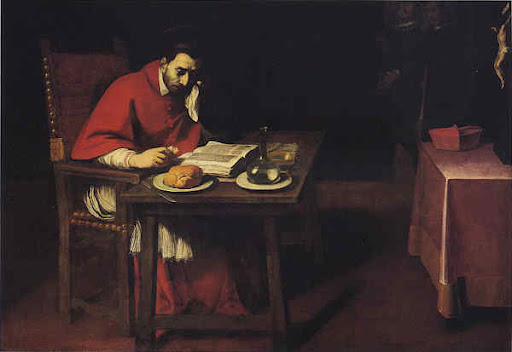The First Sunday of Lent
I once heard discipline described as “remembering what you really want.” If we were to think in these terms about the season of Lent, which began this past Wednesday, we might be able to free ourselves of our negative connotations and think of the forty days moving into Easter more positively. Like Jesus’s 40 days of meditation in the desert, during Lent we are supposed to turn away from what George Herbert calls our “passion” and look towards the spiritual. Often people undertake a spiritual discipline to focus their efforts.
Like a New Year’s resolution, however, after initial good intentions we can see our old habits reassert themsemselves. We begin resenting the discipline, we lapse slightly, we feel guilty, we feel anger at the discipline that has led to this guilt, and then at some point we abandon the discipline altogether.
In Herbert’s poem about Lent, he uses words that may well get our hackles up, words like “Authority,” “Corporation,” “doctrines,” “obligation,” perhaps even “Church” and “creed.” At one point he mentions those people who abuse Lent or spoil its good use. Although some of these words in the 17th century might not have been the turnoffs that they are today, Herbert still appears to be addressing the issue of resistance. At one point he says that, while church “authority” is supposed to increase our sense of “obligation,” sometimes it disables our power instead.
By contrast, we have a beautiful image in “the cleanness of sweet abstinence.” When we face the light rather than fear it, it is as though we are at a banquet. That’s why Herbert talks about Lent as a “dear feast.” In other words, think of your discipline as remembering how good it feels to eat better, exercise, meditate, not smoke.
On the other hand, when we give into our indulgences, there are “sluttish fumes, sour exhalations, and dishonest rheums.”
Herbert assures us that it’s okay if we have lapses in our forty days. It’s okay if we slip up from time to time, if we “cannot reach our Savior’s purity” or “be holy even as he.” We are just instructed to “do our best”:
It’s true, we cannot reach Christ’s fortieth day;
Yet to go part of that religious way,
Is better than to rest:
We cannot reach our Savior’s purity;
Yet we are bid, ‘Be holy even as he, ‘
In both let’s do our best.
When we make an effort to avoid the “by-ways” and to “meet with him,” we discover that Christ turns back and takes us by the hand. Therefore, think of Lent as a banquet for the poor and the starving. It is not held in Christ’s parlor–that’s what Easter is about–but outside his door. But Lent is a banquet nonetheless, one where we “starve sin, taking such repast as may our faults control.” One of the guests is our poor soul.
Lent
By George Herbert
Welcome dear feast of Lent: who loves not thee,
He loves not Temperance, or Authority,
But is compos’d of passion.
The Scriptures bid us fast; the Church says, now:
Give to thy Mother, what thou wouldst allow
To every Corporation.
The humble soul composed of love and fear
Begins at home, and lays the burden there,
When doctrines disagree,
He says, in things which use hath justly got,
I am a scandal to the Church, and not
The Church is so to me.
True Christians should be glad of an occasion
To use their temperance, seeking no evasion,
When good is seasonable;
Unless Authority, which should increase
The obligation in us, make it less,
And Power itself disable.
Besides the cleanness of sweet abstinence,
Quick thoughts and motions at a small expense,
A face not fearing light:
Whereas in fulness there are sluttish fumes,
Sour exhalations, and dishonest rheums,
Revenging the delight.
Then those same pendant profits, which the spring
And Easter intimate, enlarge the thing,
And goodness of the deed.
Neither ought other men’s abuse of Lent
Spoil the good use; lest by that argument
We forfeit all our Creed.
It’s true, we cannot reach Christ’s fortieth day;
Yet to go part of that religious way,
Is better than to rest:
We cannot reach our Savior’s purity;
Yet we are bid, ‘Be holy ev’n as he, ‘
In both let’s do our best.
Who goeth in the way which Christ hath gone,
Is much more sure to meet with him, than one
That travelleth by-ways:
Perhaps my God, though he be far before,
May turn and take me by the hand, and more:
May strengthen my decays.
Yet Lord instruct us to improve our fast
By starving sin and taking such repast,
As may our faults control:
That every man may revel at his door,
Not in his parlor; banqueting the poor,
And among those his soul.
